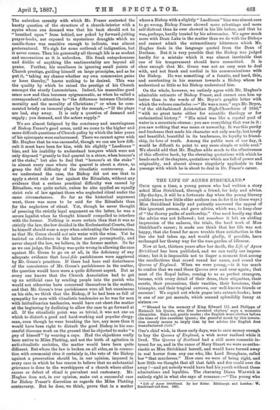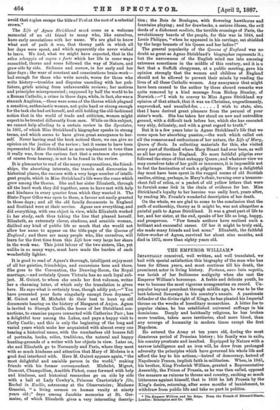THE LIFE OF AGNES STRICKLAND" Oscs upon a time, a
young person who had written a story asked Miss Strickland, through a friend, for help and advice. (By-the-bye, it will be a fortunate day when the young literary public knows how little elder authors can do for it in these ways.) Miss Strickland kindly and patiently answered the appeal of this ignorant person, and gave advice, which was, to keep clear of "the thorny paths of authorship." One need hardly say that the advice was not followed ; but somehow it left an abiding impression of the sadness, the trials, the hard work of Misa Strickland's career; it made one think that her life was not happy, that she found far more trouble than satisfaction in the line she had taken up, and would gladly, if possible, have exchanged her thorny way for the rose-garden of idleness.
Now at last, thirteen years after her death, the Life of Agnes Strickland has been published, and we can verify our impres- sions; but it is impossible not to linger a moment first among the recollections that crowd round her name, and round the Queens of England. When we were young,—is it too mach to confess that we read those Queens over and over again; that most of the Royal ladies, coming to us as perfect strangers, became, with every detail of their dress, their etiquettes, their courts, their processions, their vanities, their heroiams, their triumphs, and their tragical sorrows, our well-known friends or enemies! We copied out whole pages into extract-books; here is one of our pet morsels, which seemed splendidly fanny at sixteen :—
" 'Blessed be the memory of King Edward III. and Philippa of Hainault his Queen, who Snit invented clothes,' says a monaatio chronicler. Start not, gentle reader ; the English were clothes before the time of this excellent Queen; the grateful monk by this invest', tion merely means to imply that by her advice the English first manufactured cloth."
One's chief wish, in those early days, was to save money enough to buy the Queens of England, a wish never realised while it lived. The Queens of Scotland had a still more romantic in- terest for us, and in the cause of Mary Stuart we were as enthu- siastic as Miss Strickland herself, and would have turned away in real horror from any one who, like Lord Brougham, called her "that murderess." How sure we were of being right, and how little we thought that all that faith and fire could ever die away !—and yet nobody would have had his youth without these admirations and loyalties. The charming Diana Warwick is entirely right in what she says of romance :—" The young who
• We of Agnes Strickland. By her Sister. Edinburgh and London W. Blackwood and Sons. 1887.
avoid that ragion escape the title of Fcol at the cost of a celestial crown."
The Life of Agnes Strickland must come as a welcome memorial of an old friend to many who, like ourselves, have early associations with her name. We are glad to know what sort of path it was, that thorny path in which all her days were spent, and which apparently she never wished to leave. We find, what we might have expected, that in the salsa selvaggia ed aspra e forte which her life in some ways resembled, thorns and roses followed the way of Nature, and grew side by side. Sickness and sorrow, in her early and her later days ; the wear of constant and conscientious brain-work- bad enough for those who write novels, worse for those who write history—troubles and disputes unending with her pub- lishers, griefs arising from unfavourable reviews ; her motives and principles misrepresented ; supposed by half the world to be a Roman Catholic, a crime in those days, while, in fact, she was a staunch Anglican,—these were some of the thorns which plagued a sensitive, enthusiastic woman, not quite hard or strong enough for the task she bad set herself, and still holding the old-fashioned notion that in the world of trade and criticism, women might expect to he treated differently from men. While on this subject, we cannot help alluding to a certain review in the Spectator, in 1861, of which Miss Strickland's biographer speaks in strong terms, and which seems to have given great annoyance to her- self. Never having read the book noticed there, we can give no opinion on the justice of the review ; but it seems to have been represented to Miss Strickland as more unpleasant in tone than it really was, from the carious fact that a sentence she quotes, of course from hearsay, is not to be found in the review.
It is pleasanter to read of the many compensations, the friend- ships, the absorbing interests, the travels and discoveries in historical places, the success with a very large number of intelli- gent people, which in Miss Strickland's life were the roses which grew among the thorns. She and her sister Elizabeth, through all the hard work they did together, seem to have met with help and kindness in every quarter from which they wanted it. The State-Paper Office was open to them, a favour not easily granted in those days ; and all the old family documents in England and Scotland were at their service. Agnes saw everything, and did everything, with one object in view, while Elizabeth worked in her study, each thus taking the line that pleased herself. Elizabeth, an extremely clever, studious, and sensible woman, disliked any kind of public life so much that she would not allow her name to appear on the title-page of the Queens of England ; and there are many people who, like ourselves, will learn for the first time from this Life how very large her share in the work was. This joint labour of the two sisters, like, yet unlike in so many ways, must have made the burden of each wonderfully lighter.
It is good to read of Agnes's thorough, intelligent enjoyment of all her gaieties, friendships, and excursions here and there. She goes to the Coronation, the Drawing-Room, the Royal marriage,—and certainly Queen Victoria has no such loyal sub- ject. 3f. Guizot, to whom she sends her first volumes, writes her a charming letter, of which only the translation is given here. He says what is certainly true, though oddly put,—" You have presented your facts singularly exempt from dryness." If. Guizot and M. Michelet do their best to hunt up old documents bearing on the history of Margaret of Anjou. Agnes is invited to Sizergh Castle, the home of her Strickland con- nections, to examine papers connected with Catherine Parr ; has a delightful tour among the Lakes, and pays a happy visit to Corby Castle ; and this is only the beginning of the long and varied years which make her acquainted with almost every one bearing a historical name, with the numberless old houses full of portraits, books, relics, traditions, the natural and happy hunting-grounds of a writer with her objects in view. Later on, she and Elizabeth go to Normandy and Paris, where they meet with so much kindness and attention that Mary of Modena is a good deal interfered with. Here M. Guizot appears again," the most delightful and amiable person in the world," making friends with his former correspondent. Michelet, Mignet, Dumont, Champollion, Amedee Pichot, come forward with help and kindness, and historical researches go on side by side with a ball at Lady Cowley's, Princess Czartorisky's fête, Rachel in Emilie, astronomy at the Observatoire ; Madame Grassini, " a living sermon on human vanity at ninety yearn old ;" days among Jacobite memories at St. Ger- maine, of which Elizabeth gives a very interesting deserip-
tion ; the Bois de Boulogne, with flowering hawthorns and fountains playing ; and for drawbacks, a serious illness, the evil deeds of a dishonest modiste, the terrible crossings of Paris, the revolutionary beards of the people, for this was in 1844, and Louis Philippe, "when he appeared in his carriage, sat shielded by the large bonnets of his Queen and her ladies !"
The general popularity of the Queens of England was no. doubt as great as Agnes Strickland's biographer represents it ;. but the narrowness of the English mind ran into amusing' extremes sometimes in the middle of this century, and it is a fact that a Suffolk clergyman, at a public meeting, gave his opinion strongly that the women and children of England should not be allowed to pervert their minds by reading the lives of all these Catholic women. Any annoyance that might have been caused to the author by these absurd remarks was quite removed by a kind message from Bishop Stanley, of Norwich :—" I wish to convey to Miss Agnes Strickland my opinion of that attack, that it was nu-Christian, ungentlemanly,
unprovoked, and uncalled-for I wish to state, also, that I have derived great pleasure from the perusal of your sister's work. She has taken her stand on new and untrodden ground, with a difficult task before her, which she has executed very ably, delicately, and with a great regard to truth."
But it is a few years later in Agnes Strickland's life that we come upon her absorbing passion,—the work which called out. all the romance and enthusiasm of her nature, the Life of Mary,. Queen of Scots. In collecting materials for this, she visited every part of Scotland where Mary Stuart had ever been as well as all her prisons in England. No more faithful pilgrim ever followed the steps of that unhappy Queen ; and whatever view we may ourselves take of her guilt or innocence, it is impossible not to feel the fascination of such a pilgrimage. Many a delightful day must have been spent in the rugged rooms of old Scottish castles, sitting, perhaps, in Mary's chair, turning over a treasure- chest full of relics, or a packet of old yellow letters that were to furnish some link in the chain of evidence for her. Miss. Strickland's loyalty to her heroine was sadly hurt, years after, by reading Mr. Fronde's wonderful description of her death.
On the whole, we are glad to come to the conclusion that the path of authorship, thorny as it might be, was not altogether a. painful path to Agnes Strickland. It was a great part of life to her, and her sister, at the end, speaks of her life as long, happy, and prosperous. "Few female authors have realised such a. brilliant and successful career. Of her it might be truly said,. she made many friends and lost none." Elizabeth, the faithful fellow-worker of Agnes, survived her about nine months, and died in 1875, more than eighty years old.



































 Previous page
Previous page